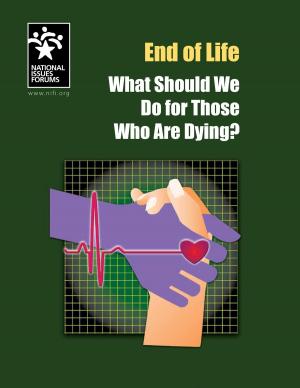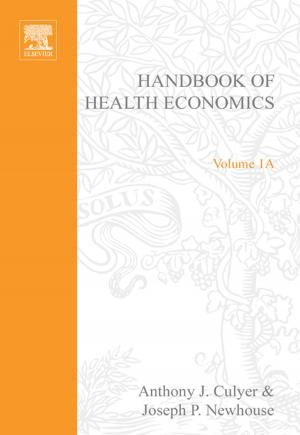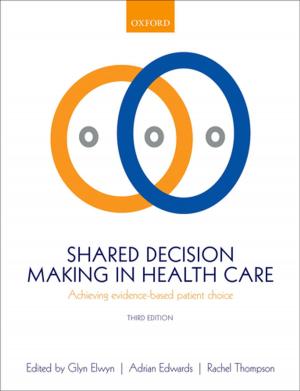| Author: | Dr. Larry Kessler | ISBN: | 9781467541848 |
| Publisher: | Dr, Larry Kessler | Publication: | September 15, 2012 |
| Imprint: | Language: | English |
| Author: | Dr. Larry Kessler |
| ISBN: | 9781467541848 |
| Publisher: | Dr, Larry Kessler |
| Publication: | September 15, 2012 |
| Imprint: | |
| Language: | English |
Next January will see the swearing in of Congress, a President, and many legislators and governors. When that happens the issue of healthcare will be on the table. Republicans are committed to repealing Obamacare. Democrats are just as committed to keeping it. No matter who’s in the White House, the new law will be reviewed, and probably changed, if not tossed out altogether. When those debates begin, if there is a single book every concerned citizen, congressman, senator, and administration official should read, it’s “We All Die Once.” “We All Die Once” is a riveting account of the past, present, and future of American medicine. From prenatal care to the end of life, this book uses history, analysis, and dramatic personal experiences to illustrate every major controversy in the healthcare fight. Starting with the emergency room, it guides readers through the modern hospital, examining individual cases to show larger truths. It chronicles lives saved, lives lost, and lives caught in the twilight world between the two. It shows how modern medicine is shaped by an anarchic array of forces, each with its own source, focus, and interests. Readers will learn how insurance, law, and DTC advertising have shaped our medical experience. They will see how technology combines with culture to create the false notion of a zero failure rate. Medical malpractice, regulatory boards, and excess testing are vividly described in stories showing real life consequences. Thorough description and argument are fine, but the true value of “We All Die Once” is in its solutions. All the firsthand accounts, arguments and history follow a logical course to proposals of sane, rational measures that balance imperfections with ideals. This isn’t a panacea, nor is it stuck in socialistic or libertarian philosophies. It’s a pragmatic way for healthcare to benefit from free market competition, allowing most of us to pay affordable prices for humane and personalized service. It retains a role for government in healthcare for the poor and needy, and returns insurance to its proper role of backup against catastrophe. It outlines roles for law and media which would protect both doctors and patients, while providing patients with accurate, objective information in an atmosphere free of high-pressure promotions. Recent healthcare bestsellers are narrowly-focused arguments about a single subject. Books like Betsy McCaughey’s “Decoding the Obama Health Law: What You Need To Know,” and “Why Obamacare Is Wrong for America” by Grace-Marie Turner et al, show their limitations in their titles and introductions. They are for or against one thing: the healthcare law of 2011. “We All Die Once” sees Obamacare as simply one more stage in the disintegration of American medicine. It looks at the whole field, from insurance to practice, from birth to death. It examines what we want medicine to be, and how we can work toward that goal. In the process it explodes many myths, and exposes extremists on all sides to harsh reality. Tea Party enthusiasts and supporters of Occupy Wall Street will love and hate this book, each for their own reasons. Legislators and policymakers will find a comprehensive tool with a complete program that avoids rigid doctrines. “We All Die Once” takes the impossible quandaries of healthcare, and subjects them to the art of the possible. Readers with an interest in medicine, economics, or public policy will find it’s impossible to put this book down.
Next January will see the swearing in of Congress, a President, and many legislators and governors. When that happens the issue of healthcare will be on the table. Republicans are committed to repealing Obamacare. Democrats are just as committed to keeping it. No matter who’s in the White House, the new law will be reviewed, and probably changed, if not tossed out altogether. When those debates begin, if there is a single book every concerned citizen, congressman, senator, and administration official should read, it’s “We All Die Once.” “We All Die Once” is a riveting account of the past, present, and future of American medicine. From prenatal care to the end of life, this book uses history, analysis, and dramatic personal experiences to illustrate every major controversy in the healthcare fight. Starting with the emergency room, it guides readers through the modern hospital, examining individual cases to show larger truths. It chronicles lives saved, lives lost, and lives caught in the twilight world between the two. It shows how modern medicine is shaped by an anarchic array of forces, each with its own source, focus, and interests. Readers will learn how insurance, law, and DTC advertising have shaped our medical experience. They will see how technology combines with culture to create the false notion of a zero failure rate. Medical malpractice, regulatory boards, and excess testing are vividly described in stories showing real life consequences. Thorough description and argument are fine, but the true value of “We All Die Once” is in its solutions. All the firsthand accounts, arguments and history follow a logical course to proposals of sane, rational measures that balance imperfections with ideals. This isn’t a panacea, nor is it stuck in socialistic or libertarian philosophies. It’s a pragmatic way for healthcare to benefit from free market competition, allowing most of us to pay affordable prices for humane and personalized service. It retains a role for government in healthcare for the poor and needy, and returns insurance to its proper role of backup against catastrophe. It outlines roles for law and media which would protect both doctors and patients, while providing patients with accurate, objective information in an atmosphere free of high-pressure promotions. Recent healthcare bestsellers are narrowly-focused arguments about a single subject. Books like Betsy McCaughey’s “Decoding the Obama Health Law: What You Need To Know,” and “Why Obamacare Is Wrong for America” by Grace-Marie Turner et al, show their limitations in their titles and introductions. They are for or against one thing: the healthcare law of 2011. “We All Die Once” sees Obamacare as simply one more stage in the disintegration of American medicine. It looks at the whole field, from insurance to practice, from birth to death. It examines what we want medicine to be, and how we can work toward that goal. In the process it explodes many myths, and exposes extremists on all sides to harsh reality. Tea Party enthusiasts and supporters of Occupy Wall Street will love and hate this book, each for their own reasons. Legislators and policymakers will find a comprehensive tool with a complete program that avoids rigid doctrines. “We All Die Once” takes the impossible quandaries of healthcare, and subjects them to the art of the possible. Readers with an interest in medicine, economics, or public policy will find it’s impossible to put this book down.















